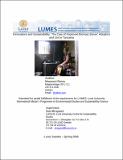| dc.description.abstract | The adoption and continued use of improved stoves in the developing countries is of social, economic
and environmental concern. In most developing countries, biomass-based energy accounts for more
than 90% of all household energy consumption. It is estimated that each year indoor air pollution is
responsible for the death of 1.6 million people in dwellings that are poorly ventilated – approximately
one death in every 20 seconds. Recent studies are increasingly showing that black carbon, mainly from
open and residential burning of biomass, is altering the reflective ability of the atmosphere and ice
surfaces hence exacerbating global warming. The invention and diffusion of improved stoves in
developing countries is therefore perceived as instrumental in the efforts to combat the negative effects
related to the use of traditional hearths. The overall aim of this study was to explore the problems that
stove users face after adoption of improved stoves and to suggest what could possibly be done to
overcome those problems.
In this study a total of 26 stove users, non-users and promoters in Tanzania were interviewed using
semi-structured, unstructured and focused interview methods. Results indicate that, at the field level;
lack of appropriate projects’ evaluation, inadequate grassroots (end-users) involvement, capability
problems, as well as stoves’ own technical faults and inflexibility are highly undermining the diffusion
efforts. In practice; women who are the primary users of stoves are either passively or partially
involved in the diffusion process. At the policy-making level; the government is yet to make stove
programs a priority and has settled for the NGO-led dissemination efforts. Results from this study will
be a useful contribution for researchers, policy makers, NGOs and groups involved in promoting the
adoption and use of more sustainable innovations. | en_US |


